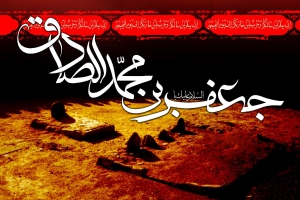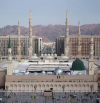The 6th Imam, Ja'afar Ibn Muhammad Al-Sadiq (AS) was born in Madina on 17th Rabiul Awwal 83 Hijiri (702 AD). Died in Madina on 15th/25th Shawwal, 148 Hijri (765 AD) at the age of 65. Period of Imamat 34 years.
Imam Ja'afar (AS) was brought up under the guidance of his grandfather Imam Zainul Abedeen (AS) whose main concern was to worship his maker and reflect on the tragic events of Karbala and whose main avenue of teaching was through supplications. He also contemplated on the presence of his father Imam Baqir (AS), who was only three years old, at that tragic time. Imam Sadiq (AS) considered it his duty to convene the recitation gatherings (Majalis) about the sorrowful event of Karbala.
In 114 Hijri (732 AD) Imam Baqir (AS) passed away, and the responsibilities of Imamat devolved on the shoulders of Imam Ja'afar Sadiq(AS).
In spite of atrocities against the Descendants of Imam Hasan (AS), Imam Sadiq (AS) went on silently propagating the teachings of Ahlulbayt. As a result, even those who did not acknowledge him as an infallible Imam, nor knew his prestige or lineage, bowed before his knowledge and prided in being counted among his students.
Mansur the Abbasid Caliph wanted to remove the esteem in which the Imam was held by the people. He tried to bring scholars to compete with him but all of them proved incapable of arguing and succeeding even with his own students. These so called Ulemas of the Durbar all admitted that their counterparts had acquired the religious learning from the descendants of the Prophet (PBUH). The arrogant caliph ignored them and continued to undermine the popularity and respect of the Imam by other means. Failing this he decided to harass, arrest or to murder him. In every town and city hired agents were posted to monitor the activities of the followers of the Imam. Anyone who was found supporting the Imam would be arrested, imprisoned or killed.
The Imam himself was summoned from Medina to Baghdad, the newly founded Capital of the Abbasid regime. Until then it was Kufa, when transferred from Damascus after the fall of the Umayyad’s. Five times he was taken away from Medina to Baghdad, questioned or harassed in one way or the other. Mansur could never find sufficient grounds to order his imprisonment or assassination. On the other hand the consequent stay of the Imam in Iraq only expanded the circle of those who wanted to learn the teachings of Ahlulbayt from him. Perceiving this, Mansur sent him back to Madina. Even there, the Imam was not spared from persecution and harassment.
Character and Virtues
Imam Sadiq (AS) was one of those infallibles who were created by God to be models of moral excellence. The character and conduct of all those sages in different stages of their lives was the standard of excellence. The particular virtues of the Imam which were recorded by the historians included hospitality, charity, the helping of the needy in secrecy, the fair treatment of poor relatives, forgiveness, patience and fortitude.
Once a pilgrim visiting the Prophet's Mosque in Medina, fell asleep. On waking up, he hurriedly searched his belongings and found his purse which contained one thousand Dinars was missing. Looking around he saw the Imam was praying in one corner of the Mosque. He accused the Imam of having picked his purse. The Imam asked about its contents and was told that it contained one thousand Dinars. The Imam then asked the man to follow him to his house where he gave the man the same amount. When the stranger came back to the mosque satisfied, once more he checked his property and found that his purse was intact in another bundle. Greatly ashamed of his conduct, he came back to the Imam, apologized and asked him to take his money back. Imam replied with these words, "We never take back what we once give away, but if you feel guilty about it, give it to the poor of the town." The traveler gave all the money in Charity to the poor of Medina.
During the days of scarcity, when people tried to hoard food and other goods, Imam asked his household manager Trenchab, "The price of corn is rising day by day. How much corn is there in our warehouse," Trenchab replied that the Imam should not worry as there was a large quantity of corn in store. The Imam replied, "Give it away to the poor and let us face the situation along with others." Then he ordered that pure white wheat flour should not be used in his kitchen, and should be mixed with equal quantity's of oat flour. "We must share misfortune with the needy and the poor as long as it takes."
Disseminating knowledge and learning
His profound knowledge of religion and other sciences was famed throughout the entire Islamic world. People came from distant regions to learn from him. The number of his students reached over Four Thousands. Among them were scholars of Jurisprudence, Tafsir, Haidth such as Imam Noman bin Thabit, Abu Hanifa and Imam Malik Ibn Anas. Heads of other religions also came there to discuss with the Imams students many matters of dispute and on many occasions returned home embracing Islam. Sometimes he himself argued with the opponents especially atheists. Apart from religious sciences, he used to teach to some students mathematics, chemistry, medicine and astronomy. Jabir Ibn Hayyan, the famous pioneer of physics, chemistry and mathematics, was his disciple who wrote about four hundred treatises based on his mentor's instructions. The jurists who learnt from him and wrote several volumes of books on jurisprudence can be counted by the hundreds.
On the question of the freedom of will (Irada) which was much under discussion at the time, the Imam taught, "that God has decreed some things for us and He has likewise decreed some things through our agency, What He decreed for us or on our behalf He has concealed from us, but what He has decreed through our agency He has revealed to us. We are not concerned, therefore, so much with what he has decreed for us, as we are with what he has decreed through our agency."
As to the question of the power (Qadr) of directing one's own actions, the Imam took a middle position, which is neither compulsion (Jabr) nor committing (Tafviz) the choice to ourselves. He was accustomed to say in prayer, "O' God, tine is the praise that I give thee, and to thee is the excuse if I sin against thee. There is no work of merit on my own behalf, or on behalf of another, and in evil there is no excuse for me or for another".
Yakubi in his Tarikh remarks in regard to Imam Ja'afar Sadiq (AS) that, "it was customary for scholars who related anything from him to say 'the learned one informed us'." When we recall that Malik Ibn Anas (94-179) the author of Muwatta was a contemporary of the Imam Ja'afar Sadiq (AS), at least a century before the time of Bukhari and Muslim, it is significant to find that it is the Imam Ja'afar Sadiq (AS) who is credited with stating what came to be regarded as the most significant and important principle to observe in judging traditions: "What is in agreement with the Book of God, accept it, and whatever is contrary, reject it".
Yakubi also relates another saying of the Imam as follows:
"There are two friends, and whoever follows them will enter paradise", someone asked, "Who are they?" He said, "The acceptance of that which you dislike when God likes it, and the rejection of that which you like when God dislikes it."
Masudi, the famous historian, wrote one of the most important sayings of Imam Sadiq (AS) ascribed through Imam Ali (AS) who is said to have related that when God wished to establish the creation, the atoms of creatures and the beginning of all created things, He first made what he created in the form of small particles. This was before the earth and the heavens were created. God existed alone in His authority and power. So He cast forth a ray of light, a flame from His splendor and it was radiant. He scattered this light in the midst of invisible atoms, which He then united in the form of our Prophet. God most high then declared unto him, "You are the first of those who shall speak the one with power of choice and the one chosen. To you I have trusted my light and the treasure of my guidance. For your sake I will form spacious channels, give free course to the waters, and raise the heavens. For your sake I will give rewards and punishments, and assign men to Paradise or to the Fire. I will appoint the people of your household (Ahlulbayt) for guidance. I will bestow upon them the secrets of my knowledge. No truth will be hidden from them and no mystery concealed. I will designate them as my proof to mankind, as those who shall admonish men of my power and remind them of my Unity (Tawheed)". The light descended, the Imam Ja'afar continued, "upon our most noble men, and shown through our Imams, so that we are in fact the light of Heaven and of Earth. To us is salvation committed, and from us are the secrets of science derived, for we are the destination that all must strive to reach. Our Mehdi will be the final proof, the seal of the Imams, the Deliverer of the Imamat, the Apex of the Light, and the Source of all good work. Those who follow us will have our support in the hereafter."
Imam died in the 10th year of the reign of Caliph Mansur, 148 Hijiri (765 AD). He had worn a signet ring with the inscription, "God is my master and my defense from His creation." It is mentioned by historians that on Caliph's orders he was given poison in grapes which caused his death.
Imam Ja'afar Sadiq (AS) was buried in the cemetery of Baqi in Medina by the side of his father Imam Muhammad Baqir (AS).


















